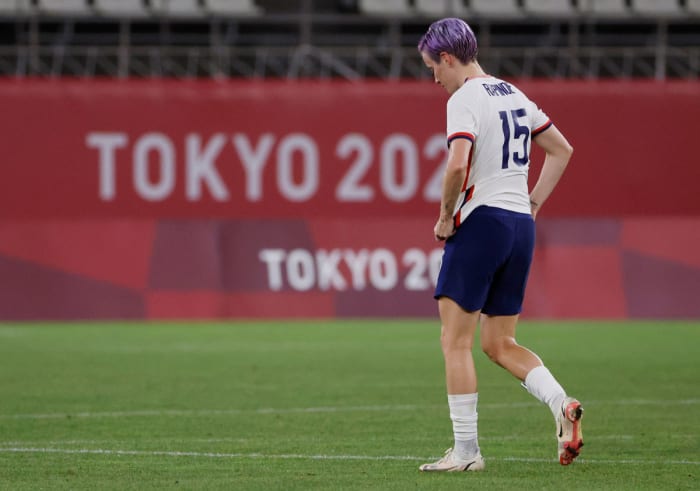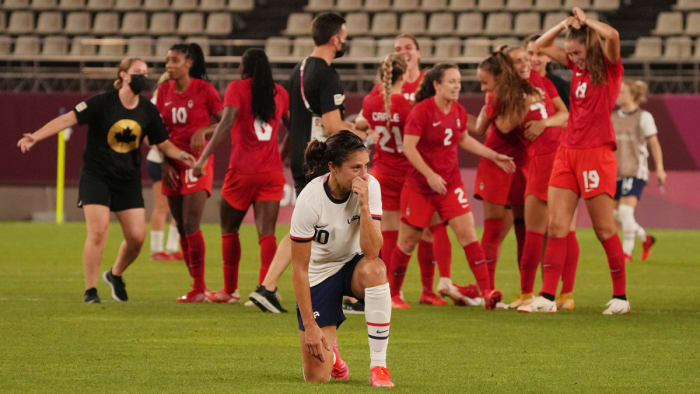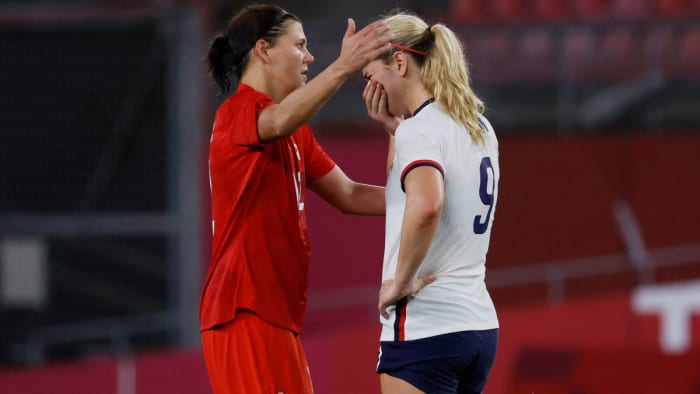USWNT Loses Its Shot at Gold—and the End of an Era Could Follow
KASHIMA, Japan – Carli Lloyd had no time left and all the time she needed, a miserable combination. As her U.S. teammates congratulated Canada on its Olympic semifinal victory, Lloyd squatted, head down. The U.S. women's national team’s 1–0 loss did not necessarily sting her more than it stung anybody else. She did not have more to lose than other players. But she had more soccer behind her.
The U.S. lost its Olympic gold-medal hopes. Lloyd lost what could be her last chance to win a major tournament. U.S. fans could begin to lose a group of women that built on the work of previous generations and cultivated a legacy of its own.
We will see some of Lloyd, Megan Rapinoe, Tobin Heath, Alex Morgan and Christen Press again. But not necessarily all together. There are a lot of takeaways from this game, but in the U.S., that will be the enduring one.
“Obviously there's a few of us that are closer to the end than the beginning, certainly,” Rapinoe said. “And we've had an amazing run. We've had a lot of nights that look different than that. … We've been through so much together, so yeah, it's kind of sad. But I feel like it's in good hands."
Canada’s lone goal came on a penalty kick by Jessie Fleming, a 75th-minute strike that was made possible by a VAR review on an inadvertent foul committed by Tierna Davidson. Other than that, the U.S. outshot Canada, 13–3. The Canadians did what lesser talented and accomplished teams do: They played a disciplined, physical game and hoped they could make the one or two plays that would make the difference. It worked, for the nation's first win over the U.S. in 20 years. If it works again, Canada will win women's soccer gold for the first time.
And yet: The U.S. looked, once again, more like an excellent team that was in transition than the best team in the world. Look at the roster—half of which comprises players aged 30 or older—and ask yourself: How many players on this team are close to their best right now? Most are either falling or rising. Rapinoe said goalkeeper Alyssa Naeher is probably the only American who can feel great about how she played in this tournament. Naeher left this game with a knee injury 30 minutes in, and Adrianna Franch was in goal for Fleming’s decider.
The USWNT has been so good for so long that it was easy to see the names on the jerseys and expect excellence. It never came. The Olympics unfold in a compressed time frame, but the sample size was big enough. The Americans never really played a great game. They had stretches in the quarterfinal against the Netherlands that hinted that a great game was possible. But then they showed up in Kashima and looked like they had for the vast majority of the tournament. Passes were a little off. Energy came and flagged.
“I don't think with the caliber players, we displayed anything (like) what we're capable of,” Lloyd said. “You know, you saw glimpses.”
These women have a lot of pride. That’s why this hurt so much. But it is also what made the run admirable. They squeezed until there was nothing left in the tube. When Lloyd finally left the field, she quietly said that she hoped the media wouldn’t want to talk to her, and then she stood in front of a table instead of behind it, as requested. It was like she did not have any extra steps in her legs.
“Just gutted,” Lloyd said. “You know, we wake up early, we train late, we sacrifice, we give up so much. You want to win.”
Lloyd, the USWNT's oldest Olympian ever, will turn 40 next summer. She is no longer in the conversation for best player in the world. But she still had no interest in settling.
Rapinoe has been a feisty and inspirational figure, and sometimes that masks her dry wit. Asked about what this means to U.S. fans, she cracked, “well, if they're hopping off now, I mean, that's pretty bandwagon-y.” She joked about reporters “trying to push me out to pasture” without a hint of anger. But she is 36. She came off the bench this week. She is a realist.
Asked about her future, Rapinoe said: “I haven’t put too much thought that I want to share with you guys to it.” Those two words, you guys, indicate that maybe she has made a decision. She also said, “We don’t really get the luxury of going one year at a time.” The next major tournament, the 2023 Women's World Cup, is slated to begin in two Julys from now in Australia and New Zealand.
If this was the end for an aging few, the American veterans handled it as deftly as anyone could hope. Rapinoe and Lloyd both pointed out they have a bronze-medal match coming up. There was no grumbling about the penalty. Rapinoe also threw a symbolic arm around the shoulder of coach Vlatko Andonovski.
Fans love questioning the decisions of the coach. It’s nice to imagine that a different lineup or combination would have been better. But Rapinoe said for all that analysis of those decisions, the difference was “everything else.” She was not quite sure how to define that, but she settled on “just getting it done.” It might read like a platitude, but it did not sound that way. It sounded like Rapinoe was saying, as tactfully as she could, that anyone blaming the coaching staff is missing the point.
“You know, this group below us and even younger than that are just a great group and fantastic footballers,” Rapinoe said, “so I feel like we've done our job. But you never want to have it end.”
Everything ends. It ends earlier for athletes than for most people. But even on a disappointing night in a frustrating tournament, you could pay two compliments to this group of players: They have been great, and their team will be great when they’re gone.
More Olympics Coverage:







